How Do They Do It?
Duck dogs have seemingly supernatural abilities

By Bill Miller
If you’ve shared your blind, and your life, with even a single dog bred to bring fowl to hand, the thought, “How did he/she do that?” has undoubtedly crossed your mind—likely 10,000 times.
While I hold in highest regard retrievers so well trained and mannered that you never notice they are with you until they are called upon to perform their priceless duties, I still spend a ton of time watching the dogs with which I’m hunting. Whether my own, my hunting partners’, or my guides’, duck dogs endlessly fascinate me.
How do they do what they do?
Volumes exist on the inconceivability of the canine’s scenting abilities to us feeble-nosed humans. Heck, I’ve contributed to those tomes. But I’m talking about capabilities that cannot be attributed even to that unfathomable sense of smell. There’s something … more.
Let’s start in the field.
If you’ve hunted in the company of a good dog, especially one gaining in age, you’ve likely seen it. It’s been a slow morning. So slow the dog is curled up in the dog box, in the corner of the blind, or across the toes of its master’s waders. The snoring is intense.
Suddenly, the dog lifts its head; totally awake. Ears go forward. Then it sits up and its eyes focus on the skyline. Five seconds go by. Then 10. Then as you try to follow the dog’s line of sight for the third or fourth time, there they are: a flock of ducks over the distant tree line.
Those ducks could easily have been a mile away when the dog awoke from the canine equivalent of deep REM sleep. It didn’t smell them, and it doesn’t seem possible it could have heard them.
I’ve even seen dogs that seemed able to tell if the distant flocks to which they were alerted were going to work our decoys, those of the next blind down the lake, or not at all.
More and more, as my own eyes have a harder time with gray light before sunrise and my ears suffer from too many rounds of clays, I find I do far better keeping an eye on a veteran dog than I do trying to spot distant ducks myself. It’s a lesson I would have probably done well to learn long ago.

How do they do it?
On every retrieve, too, the wise hunter’s mantra should be, “Trust the dog, trust the dog … .”
While my Lab, Sadie, and I were hunting divers on a lake in western Minnesota (not far from the famed Lake Christina), a mallard made a run at the decoys. The duck used the stout wind at its tail, ripping past right to left. It was close enough I didn’t have to wait for it to spin for a landing and, for once, I pulled far enough out in front. The duck cartwheeled curl feathers over golden bill into the cattails just around the bend on the opposite shore of the narrow channel inlet.
I saw it crash in. Hunkered next to me inside the burlap blind, Sadie could not.
It would have been miserable, if not impossible, to handle her to the duck. After 50 feet she’d have been swallowed up by the cattails, and on the line, she’d have only been visible a very short distance as she crossed the channel into the equally thick cover on the far side.
I knew it was wadable, so with Sadie at heel, we walked out into the water and started around the bend. The wind was howling directly at our backs.
After just 20 yards from the blind, Sadie began trying to swim to the cattails on our left. I called her back to heel. She obliged, but almost immediately paddled left again. This went on and on, so much so that I grabbed her by the collar and dragged her to the edge of the rushes where I’d seen the bird crash.
I sent her on “back” and she dutifully went in and hunted for about 30 seconds. Then she came back to the channel a few yards down, swimming hard for the opposite bank. I’d like to say that I remembered the wise duck hunter’s mantra, but the words that filled the air were a bit bluer than that. Fortunately, because I thought the retrieve would be such a gimme, I left the collar transmitter in the blind. Had it been within reach, I would have made some terrible mistakes!
Suffice it to say, in less than three minutes, Sadie was swimming beside my hip with the duck.
No way she could have seen it. No way she could have scented it—everything took place in a dead down strong wind.
How do they do it?
I recently indulged in the guilty pleasure of rereading a book that played an important inspiration in leading me to a career in outdoor writing. It’s “Run, Rainey, Run” by Mel Ellis. He was the longtime outdoor columnist with the Milwaukee Journal and later an editor with Field and Stream. The tale is the true story of a German short-haired pointer that Ellis owned, or perhaps more precisely, who owned Ellis.
The wonderful story reveals that describing Rainey’s general attitude toward Ellis as “aloof” would be a major understatement—yet their bond was almost supernatural. Throughout Rainey’s tumultuous life, at home he was a calm, passive dog—one who’d barely lift an eyebrow much less get up or offer a tail wag to greet his master when he came into the kennel.
As a writer covering the outdoor world, Ellis travelled a great deal and his dogs were often home in the care of his wife and small children. There were only two times that Mrs. Ellis reported Rainey as having been frantic in the kennel, howling through the night. Both coincided with trips on which Ellis was hundreds of miles away. In both cases he was amid severe weather, once caught in a blizzard on Lake Superior and the other while flying through storms in an overloaded bush plane. Comparing notes, Ellis and his wife discovered Rainey’s “episodes” had ended nearly to the minute when Ellis was out of danger.
How do they do it?
And then there are those inexplicable moments of total understanding. Sometimes they are in the blind. Sometimes they are in the living room at home.
Your thoughts have drifted. Some cloud or uncertainty of day-in, day-out life is weighing on your mind.
You haven’t moved a muscle. Your breathing hasn’t changed. Your heartrate is steady as a metronome. Perhaps your eyes aren’t even open.
Suddenly the hand resting on your lap or the armrest of your recliner is nudged by a cool nose. You obligingly lift it to stroke that head and those silky ears. Just once or twice. And then you both sigh a big sigh—probably in unison. And things are better.
And really, there’s no sense in wasting time trying to figure out how they do it. Sixth sense—whatever.
Simply enjoy the moment. Relish it.
For if God had a flaw in the creation of the universe, it is this: When it comes to our duck dogs, they don’t get to do it long enough.
Bill Miller is communications director for Delta Waterfowl.

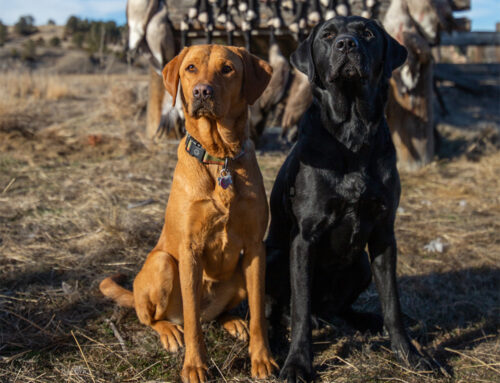
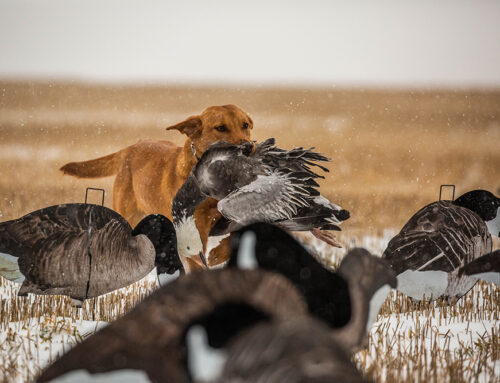
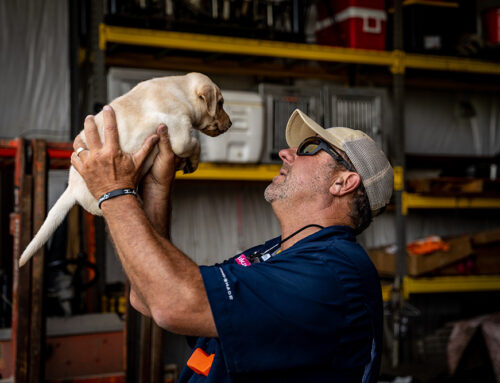
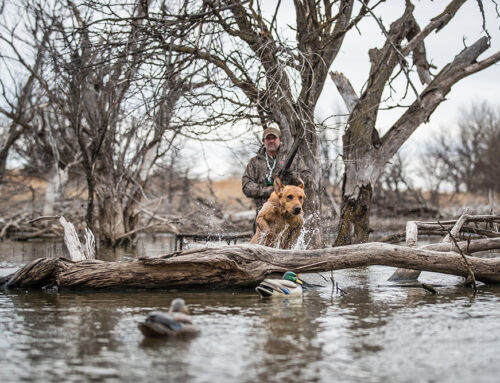
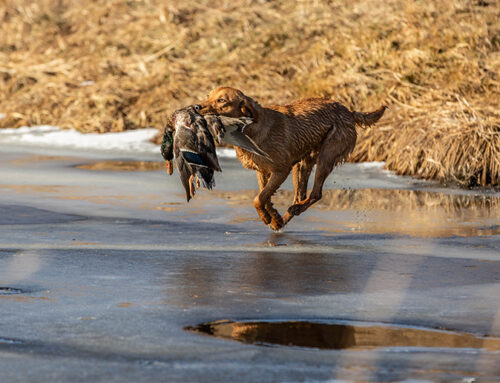
Leave A Comment